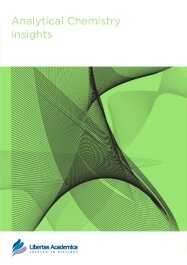

Publication Date: 18 Nov 2007
Journal: Analytical Chemistry Insights

1Graduate School of Technology, Niigata Institute of Technology, Kashiwazaki, Niigata 945-1195, Japan.2The Nippon Dental University College at Niigata, Niigata, Niigata 951-8580, Japan.3Food Research Center, Niigata Agricultural Research Institute, Kamo, Niigata 959-1381.4Department of Material Science and Technology, Faculty of Engineering, Niigata University, Niigata, Niigata 951- 2181, Japan.
Abstract: We have developed a two-dimensional (2D-) gel system of zymography and reverse zymography for the detection and characterization of proteases and protease inhibitors. Isoelectric focusing (IEF) agarose gels with pH gradients were employed for separation in the first-dimension and sodium dodecyl sulfate (SDS)-polyacrylamide gel copolymerized with gelatin used for the second dimension. Proteases and protease inhibitors separated by IEF gel were applied on the second gel without trichloroacetic acid (TCA) fixation. Protease activity in the 2D-gel was visualized as transparent spots where gelatin substrate was digested after commassie brilliant blue (CBB) staining. Some of the transparent spots from the skin mucus extract of rainbow trout were determined to be a cysteine protease through use of E-64 or CA-074. In the reverse zymography technique, the gel was incubated with papain solution at 37 ºC for 18 h. Cysteine protease inhibitors from broad bean seeds were detected as clear blue spots after CBB staining. The amino (N-) terminal sequences of four papain inhibitor spots thus detected were demonstrated to be identical to that of favin β chain, a broad bean lectin. Taken together, our system can be considered to be an efficient technique for discovering and characterizing new proteases and protease inhibitors in biological samples. This is the first report describing a 2D-gel system of zymography and reverse zymography.
PDF (1.42 MB PDF FORMAT)
RIS citation (ENDNOTE, REFERENCE MANAGER, PROCITE, REFWORKS)
BibTex citation (BIBDESK, LATEX)
XML
PMC HTML

I have published more than thirty research papers in internationally reputed high impact factor journals including Libertas Academica publications, Proteomics Insights and Analytical Chemistry Insights. I have no hesitation in saying that Proteomics Insights is highly efficient for its rapid and high quality review process and keeping the authors informed at each stage of the publication process. I recommend this journal for students, teachers and research workers who wish to publish their work. ...

All authors are surveyed after their articles are published. Authors are asked to rate their experience in a variety of areas, and their responses help us to monitor our performance. Presented here are their responses in some key areas. No 'poor' or 'very poor' responses were received; these are represented in the 'other' category.See Our Results
Copyright © 2013 Libertas Academica Ltd (except open access articles and accompanying metadata and supplementary files.)
FacebookGoogle+Twitter
PinterestTumblrYouTube